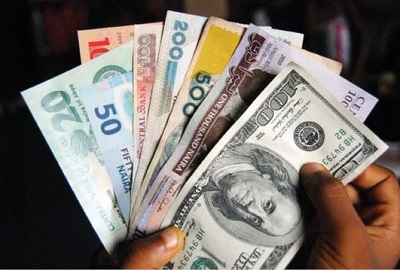The second quarter had $3.7bn: in April CBN injected $1bn; $1.2bn in May and $1.5bn in June.

The Central Bank of Nigeria (CBN) has spent $11.3 billion in foreign exchange interventions in the various segments of the interbank market in from January to December 2018.
The interventions, as released by the CBN from time to time and computed by a Daily Trust correspondent, showed that the apex bank spent $1.197bn in January, $951.4 million in February and $1.180bn in March 2018.
The second quarter had $3.7bn: in April CBN injected $1bn; $1.2bn in May and $1.5bn in June.
In the third quarter, CBN injected $2.2bn. There were $550m in July, $1.2bn in August and $420m in September. The fourth quarter, still running has seen $2bn intervention. The apex bank intervened with $210m in October, $1.3bn in November, and so far $500m this month.
On January 12, when the CBN commenced the forex interventions for 2018 in the inter-bank Foreign Exchange Market with $262.5m, the naira exchanged at N359/$1 at the street market and N305/$1 at the CBN rate. As at this week, it exchanged at 366/$1 at the street market and 306.8/$1 as the CBN rate.
The CBN interventions were in favour of the agricultural, airlines, petroleum products and raw materials and machinery sectors. Also, invisibles such as tuition fees, medical payments and Basic Travel Allowance (BTA), among others got CBN interventions.
The bank has injected a total of $24.4bn into the interbank segment of the forex market since it commenced its intervention in February 2017, the figures showed.
From the forex intervention breakdown, CBN has largely helped in eliminating the pressure on the FX market, ensured exchange rate stability and eliminated currency speculators.
According to the weekly forex sales from CBN between February 21, 2017, and August 8 this year, the bank has sold the greenback to authorised dealers in 109 sessions.
The analysis of the dollar sales further showed that in 2017 alone, the bank intervened with a total of $15.043 billion.
However, Nigeria’s external reserves continued its decline as figures released by the CBN recently showed that it has fallen to $42.6bn from a peak of $48bn.
Reacting to this, the Head of Research at FSDH, Ayodele Akinyunmi, said the decline was due to “foreign investors’ pull-back from the Nigerian market and the increase in demand at the foreign exchange market.”
“The favourable crude oil price offers support to the accretion to the external reserves in the short-term, despite the slowdown in foreign capital inflows,”Akinyunmi noted.
He further stated that if global oil price dropped significantly below $60 per barrel, the Federal Government will be forced to reconsider its oil price benchmark for the 2019 budget estimates.
With the current benchmark pegged at $61, FSDH said, “Saudi Arabia needs prices to be at $80/barrel, while Russia needs prices to stay above $60 to have an advanced budget.”
FSDH Research notes that the crude oil market developments in 2018 and 2019 appear better than in 2017.
“Despite these fairly positive developments, we are aware that the crude oil market is very volatile, therefore it is crucial to learn from the events that happened in 2014 through to 2017 in order to take proactive measures against unwarranted economic crisis in Nigeria,” it warned.
FSDH added: “Government at all levels must intensify efforts to implement policies that will grow the non-oil sectors of the economy.”
Falling oil price risky for economy – LCCI
Meanwhile, the Director General, Lagos Chamber of Commerce and Industry (LCCI), Muda Yusuf has said that declining global oil price poses a major risk to the Federal Government’s economic projections for the 2019 fiscal year and could impact adversely on its Medium-Term Expenditure Framework (MTEF).
The Federal Government had predicated its 2019-2021 MTEF on $60 per barrel. This is against data from the Organisation of Petroleum Exporting Countries (OPEC) which showed that oil prices were trending down at $59.96 per barrel on November 29 from $88 per barrel, one month ago.
According to him, “There are fears that the sharp fall in oil prices if sustained could lead to a shortage of the US dollars as capital flow reversals intensify, as oil price weakens.
“As foreign reserves come under pressure, there are worries that the capacity of the CBN to sustain the current levels of intervention in the foreign exchange market will be tested. Reserves currently stand at $42bn, down from $48bn five months ago,” Yusuf stated.
He noted that the improvement in liquidity and relative stability in foreign exchange market witnessed by businesses in 2018 will come under threats due to declining receipts from oil.
Yusuf also noted that despite sustained efforts by government to improve the business environment, Foreign Direct Investment inflows remain stagnated.
“Given the challenging economic conditions, key policy reforms would be imperative to support and sustain the stability of the macroeconomic environment,” he said.
He listed the actions to include foreign exchange management framework that reflects the market fundamentals, the acceleration of the economic diversification agenda, normalisation of Lagos ports environment, and the oil and gas sector reform, especially the Petroleum Industry Bill.
No comments:
Post a Comment